#but so many lyrics in that are So key to me on writing audrey in her relationship with orin
Note
△ do you think Orin actually cares about you?
it's invasive questions o'clock! ask and audrey will rate their discomfort and answer them

"...Seven outta ten. It's—" She purses her lips, the fingers of one hand worrying at the back of the other. The way the question is asked hurts — as if it's obvious he doesn't, as if it's obvious Audrey isn't worth caring about. It sparks a reflexive need to defend her relationship. "It's complicated. He likes me, sure. Why else would he make me his girl? And I matter to him, 'cause I know he'd be mad if I left him. But does he care about me? ... I think he cares about me like somebody cares about a thing, not another person. He cares if I'm there, not if I'm happy." Her voice grows quieter and quieter as the murmurs a small refrain of comfort, something she's told herself over and over again to make Orin's behavior hurt less. "I think that's the only way he knows how to care. It's how he is. And if that's all he has, and it's what he gives me, then he loves me as much as he can. Some people just love wrong..."
#really going for the jugular on the first question huh?#['the worse he treats me' playing increasingly loudly in the bg]#look. ultimately correct they cut that song because it would risk people misinterpreting audrey as a masochist#but so many lyrics in that are So key to me on writing audrey in her relationship with orin#if you haven't listened to it you should (with HUGE tw on abuse discussion tho). i'll link the song in the replies below#❦ NOW YOU WERE SAYING [ answered asks ]#ღ HE'S THE ONLY FELLA I GOT [ c; orin ]
4 notes
·
View notes
Text
A Poet in my Thoughts
Petal 26
I think now is a good a time as any to share some of my poetry I have been writing with you. Some are about love, some are about music, some are about birds. I hope you enjoy this short collection. I have been reading a lot of Rumi lately and got inspired. He has to be my favorite poet next to Maya Angelou and Langston Hughes.
The Englishman
There’s an Englishman I’ve never met who speaks to me through the treble clef. His music and lyrics I could hear all day and never get tired from the notes that he plays. Some stories of love, of friends or make believe, his ramblings are cluttered poetry; perfectly incomplete. The presence of his sound had been around for a while but my eyes were nay apparent to his eclectic style. Two years ago he struck me with one particular tune a hymnal of the Gospel of finding you. And although if we ever met then a song would ring so true, I’d love to hear the melodies we pen on the B-side with you. A song for you, a song for me, a song for the pining chorus of lovers at half past three. The song is smooth and full you can hum the rest of it now. The Englishman’s treble clef is the symphonic cacophony in the round.
A Friend who can Cuss
Sometimes you need a friend who can cuss. A friend who is uninhibited enough to say well that’s Effed up. A friend to say what you feel even when you aren’t free enough to say it. The poor sinner in me is pleading to be acknowledged. The sacrilegious Gospel of secularism is having the floor, which door do I let it seep out of? The mouth? No, that is too commanding of a stage. The mind? Too strong still. The ear? Not loud enough yet. The memory? This is where I will place it. The memory. My breath will stop short
leave and come in Again
Exhaling in a chuckle dripped with sin. I’ll remember my friend who says it’s Effed up when I rant about what’s eating me from within. I’ll remember them.
Flightless Phoenix
I see crows on my morning walk. Wings expanded on each post dangling back and forth. Simon and Garfunkel’s “America”in my headphones.
My dog bent over puzzled at the bush that seems to move. She prepares herself to launch into an attack against the oncoming threat. It only looks to be a strange small bird with a broken wing waddling out of the sunlight and into the welcoming shade. See here a bird that is bruised but continues to move. See here lost in the shuffle hopeful for the shade. See here a bird that is about to be personified as a symbol for restitution and healing. A symbol of starting again on your own path. The bird has passerby’s stepping lightly avoiding the baby I call Flightless Phoenix who has built its own nest of freedom. I turn the corner and think of the bird. The flightless beauty of joy. I walk back around the bend and the bird is headless. A truck has flown down the way and didn’t watch Flightless Phoenix making its own lane. From inspiration to mourning. From freedom in life to freedom in death. Flightless Phoenix is headless. Blood dripping remains stain the sidewalk now riddled with dangerous acidic diseases to any who intercepts the flightless Phoenix. Once remarkable in life, now still just as threatening and dangerous in death.
My Sonata
A gale blows outside
upper echelons of sadness
an Audrey movie on low I’m scrolling for a reason to leave you.
Found what I was looking for
You liked her picture one too many times
And I’m finally getting sense.
You never heard at least two of mine so I’ll exchange them for dollars. I wish there was a way to erase the pain but it’s the only thing that makes me feel alive. The Sun is overrated when you’re hopelessly in love. The moon can be your therapist when there’s no drink in your cup. I feel the weight of sleep like pins and needles but I’m still up pining for you.
If I could play you a Sonata I would only use the good notes. The Black Keys to my heart no copies were made. I told you yesterday. All you said was ok. You don’t want to fight for me. Even when I gave you the recipe to loving me. I said I had walls and gave you pry bars and a sledgehammer. All you had to do was try. And you said you don’t have the time.
This is my sonata to you I hope you always sing it out of tune. You can never get to me again I hope you fall out with all your friends. Don’t ever contact me again of course you won’t. You only care for you. I still have love and it’s eating away at my mind and I lose time everyday wasting it on loving a man that walked away. Loving a man who always has the final say. You can’t tell time and no one ever taught you how. This is my sonata now the silence for swollen ears.
#music#songstress4life#chelseaj#sunflower#tailored#chelseajmusic#thought blog#thoughts#poets on tumblr#original poem
7 notes
·
View notes
Text
🌸85 Questions🌸
Since the last time I did this tag was a few months ago, I thought I’ll do it again. I was tagged by the cutie @taeyongsflatbutt thanks dear💖
Rules: Answer these 85 statements about yourself, then tag 20 people.
Last
1. Drink - tea and water
2. Phone call - I literally never call anyone besides my therapist, so yeah, my therapist :3
3. Text message - I’m currently spamming my baby @taetaejagiyaaa95 with links to dance performances of the dance club I’m in lmao
4. Song you listened to - I’m listening to What Now by Rihanna as I’m writing this (I’m actually listening to the playlist @taetaejagiyaaa95 made for me💖)
5. Time you cried - Today while listening to Grow Up by Stray Kids because the lyrics and the song in general hit me so hard that I cannot listen to it without crying T-T
Ever
6. Dated someone twice - nope, when I end something it’s a definite end and I’m not getting back together with that person
7. Kissed someone and regretted it - Actually yes... because there was this one time when this guy pressured me and kind of forced me into kissing him and I didn’t know how to escape ;-;
8. Been cheated on - not that I know of :o
9. Lost someone special - Haven’t we all? :/
10. Been depressed - Probably at some points in my life
11. Gotten drunk and threw up - yup >.< but I was like 13/14 years old back then and a stupid idiot
Fave colors
12. I seriously love all colours
13. Especially pastels
14. and of course black
In the last year have you…
15. Made new friends - YES💖
16. Fallen out of love - definitely (glares @ ex bf for treating me like crap and just ghosting on me without ever explaining his actions to me...so I guess that’s over for good)
17. Laughed until you cried - I always cry when I laugh tbh and my friends like making fun of me then xD
18. Found out someone was talking about you - probably but I can’t really remember since I push such moments out of my mind
19. Met someone who changed you - I believe every person you meet in your lifetime has some kind of impact (big or small) on you and thus changes you to some extent (maybe only just for the time being they’re in your life but still)
20. Found out who your friends are - Yes, I am actually better at reading people than it may seem^^
21. Kissed someone on your Facebook friends list - Idk I don’t use facebook anymore xD
General
22. How many of your Facebook friends do you know irl - Again, idk since I don’t use it anymore
23. Do you have any pets - a Kitten💖
24. Do you want to change your name - My last name, yes. Since I don’t like it and people like making fun of it smh
25. What did you do for your last birthday - I went out to dinner with my mom and stepdad and ended up having the whole restaurant sing me happy birthday^^ it was awesome omg
26. What time did you wake up today - At noon I think
27. What were you doing @ midnight last night - I was finishing off a reaction on my blog @kachuwritings and posted it
28. What is something you can’t wait for - My I am WHO album to finally arrive T-T
30. What are you listening to right now - Daya - New
31. Have you ever talked to a person named Tom - nah, I don’t know no Tom :o
32. Something that gets on my nerves - Someone interrupting me when I’m in the middle of daydreaming, people who brag about how great they are and in general just arrogance gets on my nerves a lot, animal cruelty is something that makes me extremely mad and sad and in general people with bad personalities/who abuse others/treat others badly, any form of discrimination and inequality in this world, our society and especially the unrealistic beauty standards our subconscious is being fed through the media 24/7 and so many more
33. Most visited website - Tumblr, YouTube and Vlive
34. Hair color - black^-^
35. Hair long or short - about middle length but I’m growing it out c:
36. Do you have a crush on someone - yesssss but not on someone I know irl glares @ Han Jisung from the other side of the world
37. What do you like about yourself - I really like being an empath tbh because it allows me to fully understand other people’s struggles and it can be nice to feel everything so deeply (love for example) (of course there’s also a downside to it) :3
38. Want any piercings - I already have 8 piercings on my ears but I always thought about getting nipple piercings someday but I honestly don’t know about that one^^’’ what do you think?
39. Blood type - A
40. Nicknames - Kachu
41. Relationship status - married to Han Jisung in my head single like a pringle
42. Zodiac - Aquarius
43. Pronouns - she/her
44. Fave TV shows (Can I add anime? I don’t watch other TV shows) - Sword Art Online, Tokyo Ghoul, Ouran High School Host Club
45. Tattoos - A violin key with a rose on my right forearm (that I drew myself and it signifies my love for music) and I’m thinking of getting angel wings on my shoulder blades but I need to draw them first kdjdksooidsfuhi
46. Right or left handed - right
47. Ever had surgery - nope
48. piercings - ears
49. Sports - dancing,,,mainly & hula hooping
50. Vacations - I’ve been to England, Spain, France, Germany, Switzerland(of course), Denmark, Czech Republic, Austria, Italy and Greece already but never outside of Europe jckdcudscn but I’m going to South Korea next year c:
51. Trainers - uhm... don’t really know what to answer here???
More general
52. Eating - I ate potato salad for dinner but that was around 6 hours ago lmao
53. Drinking - water^-^
54. I’m about to watch - Nothing since it’s 3.30am and I should go to sleep
55. Waiting - for better days *sigh*
56. Want - to be more motivated and not always feel exhausted and powerless on a daily basis because every little thing gets me overwhelmed lately and I feel so lazy since I lack power to accomplish anything and I have so much shit to do T-T
57. Get married - not sure ._.
58. Career - Probably psychologist but I’m actually dreaming of becoming a singer&songwriter
Wich is better
59. Hugs or kisses - Depending on my mood either can be better
60. Lips or eyes - ....I love both equally tbh, beautiful eyes and plump lips really affect me sjakdansfunoj Hyunjin’s lips are a good example seriously they look so soft :( and Felix’s eyes are extremely beautiful and big wow
61. Shorter or taller - shorter because I’m too tall and I hate it ._.
62. Older or younger - younger, I don’t wanna grow up the world seems to only get worse the older I get akfnsdfisdsuld
63. Nice stomach or arms - hmmmmm I LOVE slim waists so I guess stomach?
64. Hookup or relationship - relationship!!! ALL. THE. DAMN. WAY. i can’t stand hookup culture :/ (but you do you fam, I’m not gonna judge anyone since it’s none of my business)
65. Troublemaker or hesitant - hesitant (I’m a good girl okay :c)
Have you ever
66. Kissed a stranger - I don’t think so omg
67. Drank hard liquor - yup, long ago though, I barely drink since I don’t like alcohol due to,,, reasons
68. Lost glasses - surprisingly, no xD
69. Turned someone down - unfortunately, yes :/
70. Sex on first date - It wasn’t a date... o.o it was just a hookup and that made me realize that I dislike sex without love involved and that’s how I found out that hookups are nothing for me^^’’
71. Broken someone’s heart - Probably the people I’ve turned down :/
72. Had your heart broken - ...yes
73. Been arrested - OMG NOOOOOO :o
74. Cried when someone died - Yes
75. Fallen for a friend - No never
Do you believe in
76. Yourself - I really wish I could
77. Miracles - not sure but I hope they’re real T-T
78. Love at first sight - naah
79. Santa Claus - yeeeah no, I’m not 5 years old anymore honey^^
80. Kiss on first date - Sure if it feels right
81. Angels - Not sure o.o
Other
82. Best friend’s name - I don’t have a best friend actually... (applications are open lmao)
83. Eye color - a really ugly brown istg there are so many beautiful kinds of brown eyes out there and mine just look ugly tbh D:
84. Fave movie - I have so many skaudbjf but Harry Potter is pretty high up on the list (I cannot trust people who dislike Harry Potter... my ex disliked it...yeah that just confirmed my hypothesis)
85. Favorite actor/actress - I always liked Audrey Hepburn, Olivia Newton-John, Julia Roberts, Keira Knightley, Emma Watson, Cameron Diaz, Meryl Streep, Amanda Seyfried, Pierce Brosnan, John Travolta, Patrick Swayze, Jack Black, Logan Lerman, Dylan O’Brien, as well as Leonardo DiCaprio, Johnny Depp, Orlando Bloom, Colin Firth and Hugh Grant - see, I can’t choose D:
soooo that was it yay^^ I’m tagging @marculees @taetaejagiyaaa95 @glamjae @bloomingfantasy @taetarte @1oonar @00njm @star-sam @hyunjinsgiggle @jbemin @orrin-uwu @redcucumbers @donghyuwus @alonelysquid and as always, you don’t have to do it💖
20 notes
·
View notes
Photo
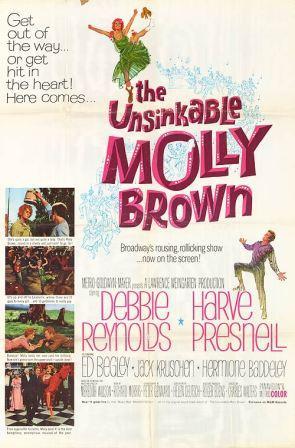
New Post has been published on http://www.classicfilmfreak.com/2017/01/12/unsinkable-molly-brown-1964-debbie-reynolds-harve-presnell/
The Unsinkable Molly Brown (1964) with Debbie Reynolds and Harve Presnell
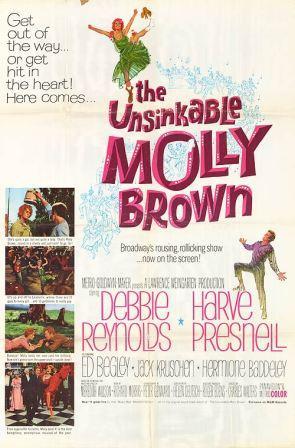
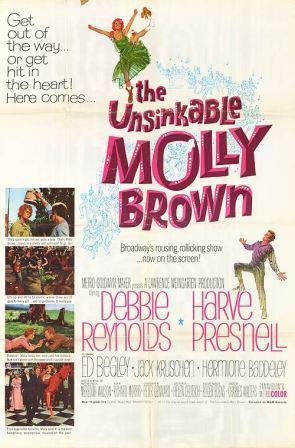
“Sure, I may be tuckered, and I may give out, but I won’t give in.”— Molly Brown
Quality Hollywood movies somehow increased in 1964, and one of the best years of the decade offered a little more variety than usual. Dr. Strangelove shocked as an imaginative black comedy about two superpowers on the brink of world destruction and The Night of the Iguana did its own shocking with alcoholism and repressed—and expressed—sexual passions. Becket as a serious historical, Shakespeare-like drama portrayed a king and his wayward archbishop and Zorba the Greek made high cinema of an earthy peasant. The Pink Panther offered the greatest contrast of the four; to an unsuspecting world, it introduced the bumbling Inspector Clouseau and his personification in one Peter Sellers.
Being in the center of a decade of extravagant musicals, 1964 alone produced three competitive song and dance films—Mary Poppins, My Fair Lady and The Unsinkable Molly Brown. In most of the Oscar categories two of them, sometimes all three, were nominations. When a musical won, which was thirteen times, it was never The Unsinkable Molly Brown.
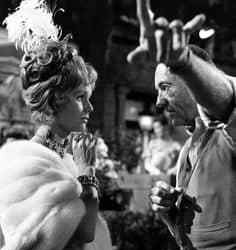
And its nominated Best Actress star, Debbie Reynolds, lost to the favorite, Julie Andrews, for Mary Poppins. It would be Reynolds’ only Oscar nomination, though she received the Jean Hersholt Humanitarian Award at the 2015 Oscar ceremonies, February 28, 2016, belatedly extended by the Academy, as usual for elderly, Oscar-less stars. But even that was none too soon, for Reynolds died on the twenty-eighth of another month, December 2016.
She is perky and high-stepping in Singin’ in the Rain (1952), easily her most popular and best film, and one of the greatest musicals of all time. Untrained as a dancer, Reynolds was highly tutored by Gene Kelly, co-director with Stanley Donen. She shared her choreographic routines with another light-footed elf, Donald O’Connor, and no one would have ever imagined she wasn’t a professional dancer from the start.
In The Unsinkable Molly Brown, music and lyrics by Meredith Willson, she is more than a mere “high-stepper”: she is a keg of dynamite about to explode. She is loud, common and vulgar, until she transforms her character into a lady—well, only partially—and seeks a place in the upper echelons of society. There, at first, she finds only snobbery and exclusion, but determined—and “unsinkable,” as it will prove—she triumphs and receives all she ever desired during her poverty days.
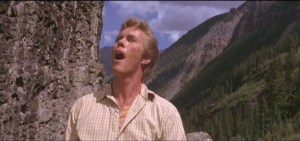
Although Debbie Reynolds’ supporting cast members are all competent and throw themselves with wild abandon into some of the crazy antics of the film, she has only one serious co-star, one fellow singer of stature, Harve Presnell. There is obvious chemistry between her and this six-foot-five-inch, gangling actor, who never competes with but compliments Reynolds with his quite different acting and singing style.
Unfortunately, Presnell’s career faltered in the closing years of the decade, when the vogue for musicals, reaching a pinnacle with The Sound of Music in 1965, was fading, at least for a while. Doctor Doolittle (1967) and Hello, Dolly! (1969) were among several singing disasters. In Paint Your Wagon(1969), sluggishly directed by Joshua Logan, Presnell is the only professional vocalist among such non-singers as Clint Eastwood, Lee Marvin and Jean Seberg, though she, fortunately, was dubbed (by Anita Gordon).
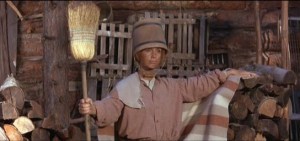
A baby, surviving the rapids of the Colorado River, is adopted by frontiersman Shamus Tobin (Ed Begley, Best Supporting Actor Oscar two years earlier for Sweet Bird of Youth) and given the name Molly (Reynolds). Molly becomes a tomboy, dresses in trousers and a shabby shirt and uses foul language.
Her fight with Shamus’ three sons produces a rip-roaring “I Ain’t Down Yet,” and between lyrics she expresses her philosophy: “I hate the word ‘down,’ but I love that word ‘hope,’ ” and “I mean much more to me than any one I ever knew.” Soon, though, Molly believes it’s time to leave, with two objectives, to learn to read and write and to marry a rich man.
Against a sumptuous mountain landscape, the owner of a gold mine, Johnny Brown (Presnell), bursts into song: “Colorado, My Home.” After happening upon Molly taking a bath in the river, he takes her to his cabin.
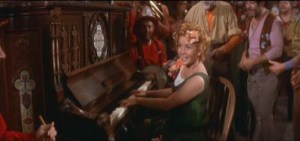
After a brief stay, she goes to Leadville and is hired by saloon owner Christmas Morgan (Jack Kruschen) as a singer and piano-player, though she cannot sing or play. Toying with the keyboard, Molly finds two notes, one in the treble, one in the bass, that comprise her “piano playing,” and she becomes a hit in “Belly Up to the Bar, Boys.”
Johnny buys her some dresses and begins teaching her to read. Under a tree on a knoll, lessons continue and Presnell sings the key song of the musical, “I’ll Never Say No.” The song is the equivalent of “Till There Was You” in Willson’s first musical, The Music Man (1962). For tune detectives, “I’ll Never Say No” uncannily resembles the trio of the scherzo of Brahms’ Horn Trio in E-Flat.
Johnny remodels his cabin, with a room for Shamus and, for Molly, a bedroom with a big brass bed. The couple wed, but she confesses it isn’t what she wants, that there’s still . . . money. He sells his claim for $300,000, but unaware she has hidden it in the stove, he decides to warm himself after a cold bath, and—— No, money doesn’t matter after all, they decide. Johnny tosses a pickax in the air, it strikes a nearby mound of earth and gold trickles out.
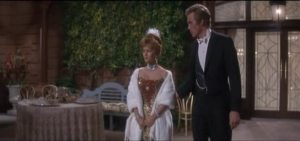
Now back in the money, the Browns buy an enormous mansion in Denver, with a room for Seamus. They introduce themselves to the city’s social elite, crashing the party of Gladys McGraw (Audrey Christie), but they are excluded from the table of the so-called “Sacred 36” of Denver, and the butler closes the door in their faces.
An angry Molly then throws her own party. Nobody comes, though Shamus hits it off with “Buttercup” (Hermione Baddeley), Gladys’ mother. Molly decides the Browns will go to Europe and learn something about art, music and manners.
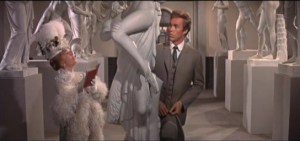
In Paris, they wander through museums, gaze at paintings, stare warily at nude statues and attend the opera. Molly takes piano and French lessons. The royalty like the down-to-earth Molly and she becomes the toast of Parisian society. At a clique fashion show, she meets the Grand Duchess Elise Lupavinova (Martita Hunt, Miss Havisham in Great Expectations [1947]), who winks at her, and becomes a friend.
The couple return to Denver, accompanied by ten of Molly’s aristocratic friends. She intends to show the second-generation society of Denver some real culture. She does well at first. Mrs. McGraw is clearly impressed and shamed to be exposed as only a dilettante of the arts, unable to converse in French or German, paint or play the piano.
But things go awry when Johnny’s friends crash the party, resulting in a long rendition of “He’s My Friend.” Then a fight breaks out, and Molly’s plans for gaining the approval of Denver society are destroyed.
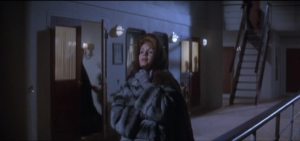
She returns to Europe—without Johnny, who tells her he’s saying “no” for the first time. Before long, she realizes that putting herself before others is wrong and sets sail for home on the Titanic. When the liner sinks, she rescues many of the passengers, giving up her fur coat.
Returning home, now as a headlining heroine, she is accepted by all of Denver, including Mrs. McGraw, and, of course, Johnny.
Margaret, actually “Maggie,” Brown was a real person, born in Missouri and dying in 1932 at age 65, but much of The Unsinkable Molly Brown is far from accurate. Certain liberties are taken, both with the facts of the real Brown and with simple screen logic. It is a musical, after all, so these liberties are expected and can mostly be excused. If it goes on a little too long for the material at hand—the musical has far fewer and less memorable songs than The Music Man—and becomes sluggish at times, it is nevertheless high screen entertainment, typical of the decade, the era and the history of the American musical.
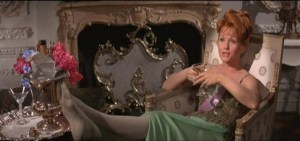
Debbie Reynolds is the star and she takes charge, no doubt about it. Her vitality and sincerity—and her likeability—compensate for the deficiencies in the film. It’s possible to see in her portrayal of Molly a reflection of Reynolds’ own character—determined, someone who knows what they want, a survivor. It’s possible, as well, to see in Molly’s distraught anguish, in that scene before her final departure from Paris, the shattering traumas in the actress’s own life—the scandalous lost of first husband, Eddie Fisher, to Elizabeth Taylor, the bankruptcy of her second husband and the death of daughter Carrie Fisher one day before she herself died of a stroke.
Perhaps, finally, Debbie Reynolds was what Molly Brown called “down,” what she never wanted to be. Perhaps it was more than the actress could take.
https://www.youtube.com/watch?v=Vk10MoMpMIA
2 notes
·
View notes
Text
Program Notes from Ever-Fixed Mark: A Senior Voice Recital
An Introduction
Last year, I presented a junior lecture recital entitled “Symphonic Shakespeare”, a study of the adaptations of playwright William Shakespeare’s texts into western Classical music. It only made sense that I should continue learning about the ways in which his timeless narratives and characters were rewritten, redefined, or interpreted by the music in which they were set. This recital aims to address the role of the soprano, which I have come to find in many contexts represents the love interest. It is no secret that Shakespeare’s writing embodies a type of romance, eroticism, and affection that shapes the way we as a society approach and understand relationships. Aside from understanding the significance of adaptation, then, this recital is to showcase the multifaceted and complex concept of “love”.
About the title: “Ever-Fixed Mark” is taken from Sonnet 116, in which he writes: “Love is not love / Which alters when it alteration finds, / Or bends with the remover to remove. / O no! it is an ever-fixed mark,” (116: 2-8). I thought it was fitting, as all of the songs on the program have to do with love or some shape of it, to name my recital. Additionally, written notation, music itself is but an ever-fixed mark, bound to exist so long as the score, or even the melody from rote, is maintained.
“It was a lover and his lass”
The arts have intertwined for as long as they’ve existed as a means of expression—and in the English Renaissance, especially on the stage of the Elizabethan theatre, so they did. “It was a lover and his lass” was a diegetic (meaning the music was a witnessed part of the performance) number in Act V, scene III of As You Like It, sung by one of the pages to the betrothed Audrey and Touchstone. In the scene, Touchstone expresses dislike of the song, as it represents little of actual love; its lyrics are ridiculous, overall, it’s silly, and there’s really no substance—but the music, just as love itself, is beautiful despite the frivolity of the antics happening lyrically.
Thomas Morley (1557-1602) was an English renaissance secular and sacred composer, singer, organist, and publisher, probably most renowned today for his madrigals (secular a cappella pieces for six to eight voices). He published this tune in his anthology, First Book of Ayres, in 1600. It contained English songs for voice and lute, and although it cannot be confirmed that this version of the song was used in the production that William Shakespeare would have presented at the Globe, it is known that Morley and Shakespeare, two creative contemporaries, did not collaborate accidentally.
“If Music Be The Food of Love”
Following his death, Shakespeare’s works (as well as those of other authors) were disseminated into spin-offs and retellings by other playwrights and publishers. His portfolio edition of these stories would disappear from the repertoire, but nonetheless influenced English literature and drama for centuries to come.
Colonel Henry Heveningham (1651-1700) created a text, adapted from Duke Orsino’s opening dialogue in Twelfth Night I.i.1-15 as he laments to his attendant Curio about his failed attempts at wooing the fair Olivia. Compare the original text to the lyrics below:
Although it certainly comes from the same place (Duke Orsino’s desperate, fascinated appetite for a humanistic satisfaction be it tangible or expressed through creative means) it’s obviously different. The latter, by Heveningham, is written as a ballad, between two lovers, instead of an address. Henry Purcell sets this strophic text with word painting, the longing emphasised by a melody that slowly climbs the staff with accompanying crescendo, that eventually falls dramatically at the end of the verse, relinquishing itself to the accompaniment and too, hypothetically, the object of the serenade.
“O, let me weep,” from The Fairy Queen
The Fairy Queen is another example of Shakespeare’s work being adapted after his death. This particular semi-opera, first performed in 1692, is based on Midsummer Night’s Dream—in the spoken moments, the original text remains unchanged, but Henry Purcell (1659-1695) and his librettist Elkanah Settle (1648-1724) change some of the text in ‘masques’, or musical scenes prompted by magical, supernatural, or drunken characters, to fit seventeenth-century dramatic conventions. “O, let me weep”, or as it is more commonly called, ‘The Plaint’ is one of these masques. It was written after the opera had already premiered, as a kind of showcase piece for countertenor or soprano performer—superstars in their own right during the Baroque era.
The Baroque era was the last period in which English composers held strong relevance until the turn of the twentieth century, compared to their continental contemporaries. Henry Purcell was a powerhouse in this regard; he was proficient in various styles of counterpoint yet mainly championed the English Baroque style in his works, composed in both sacred and secular genres with substantial popularity, and also composed for theatre and opera.
“V’adoro, pupille” from Giulio Cesare
Shakespeare wrote the historical drama Julius Caesar in Spring of 1599. The political tensions in England were high, as Queen Elizabeth reached the end of her reign. Subjects of republicanism versus monarchy were circulating, and to depict the killing of a king would be tantamount to treason. However, by using Plutarch’s Lives as his source material, an author that Queen Elizabeth I studied, he effectively avoided the threat of creative persecution. In the eighteenth century, however, the subject of a political history was ripe for opera seria—and librettist Nicola Francesco Haym (1678-1729) created Giulio Cesare in Egitto with Georg Frederic Händel (1685-1759) for the Royal Academy of Music in 1724 during the composer’s tenure at the English court. It was a relatively successful work, and one of Händel’s more (if not most) well known Italian operas to date.
Her presence may be more pertinent in the related Shakespearean tragedy, Antony and Cleopatra, but in Händel’s opera, Cleopatra’s affairs are everything but ignored. In this aria, she admires the young, handsome Julius Caesar, lamenting their never to be love, as she’s far past her courting years:
Fünf Lieder WoO post. 22 (Ophelia-Lieder)
The German translations of many of Shakespeare’s plays appeared in the early 19th century, sparked by Schlegel-Tieck’s publication. Among other composers to set Shakespeare’s works, Johannes Brahms (1833-1897) approached the setting of Ophelia’s songs in a really interesting way by honouring the sing-song style of the text and folly and falter of rhythm in her speeches, and too had a particular choice of harmonic language. He uses very basic piano accompaniment that resembles a kind of pastorale Renaissance style—in the first and second songs, simpler, lute-like voicings and strophic melodies in the soprano. In the third setting, “Auf Morgen its Sankt Valentin’s Tag,” we hear an off-kiltered compound duple meter that almost feels like the pillars of a village dance. In the fourth and fifth songs, Brahms alludes to a sort of chorale or hymn form, but more notably uses a mixture of modes (variations of scales) between A-flat major and its relative minor key of F. This simple relationship ties together more antiquated musical forms and the Romantic style, which nineteenth-century composers defined with manipulations of harmony and tonal center.
The english translation given is not a direct interpretation of the German lyrics, rather the original text from Hamlet Act IV scene v, lines 23-26, 29-33, 48-55, 165-187, and 190-201, respectively.
“Je veux vivre,” from Roméo et Juliette
The stage of the French grand opera is the perfect setting for the melancholic story of the teenage star-crossed lovers. After his major success, Faust, Charles Gounod (1818-1893) and his librettists, Jules Barbier (1825-1901) and Michel Carré (1821-1872) premiered the opera at the Théâtre Lyrique Impérial du Châtelet, Paris in April 1859, and it rose to great success with over three hundred performances in the first eight years of its lifetime.
Juliette’s aria is a testament to teenage life and fleeting crushes. The viennese waltz setting is fitting for the scene in Act I, when all of the characters are meeting at the Capulet estate for her birthday. Juliette’s whimsy enchants Roméo, and all present. The foreshadowing in the lyrics is exquisite.
“Orpheus with his lute”
Oddly enough, the fervent revival of Shakespeare in the nineteenth century continued well into the following years—as theatres continued to perform his work, it was picked up and circulated. British composers especially, such as Roger Quilter, Ralph Vaughan Williams, and Benjamin Britten, among others, sought to honour and redefine their nation’s artistic heritage in the twentieth and twenty-first centuries.
Ralph Vaughan Williams (1872-1958) was influenced heavily by Tudor music and brought elements of English folk song into his operas, ballets, religious music, and symphonies. “Orpheus with his lute” is an example of a neo-classical (twentieth century interpretations of Classical or eighteenth century compositional styles) reimagining of Patience’s song from Act III scene I of Henry VIII. The 1901 score is the first of two settings by Williams of the same text.
“Falling in love with love” from Boys from Syracuse
Boys from Syracuse is a 1938 musical by Richard Rodgers (1902-1979) and Lorenz Hart (1895-1943) with book by George Abbott (1887-1995) based on A Comedy of Errors. Adriana sings this tune in Act I, while recanting the stories of her romance with her husband to her sewing circle. Love, although promising, isn’t always as it seems. Rodgers used the dance form, the waltz in particular, to set the ‘mood’ of romance and anticipatory or longing emotions. In the age of Musical Theatre composition, the use of these subliminal musical association works to create further drama and ironic or comedic juxtaposition.
The collaboration between Rodgers and Hart was short-lived, and the pair had a falling out—not romantically, but the song holds as a testament perhaps not only to Adriana’s woes, but too their professional relationship.
“The Star Crossed Lovers”(“Pretty Girl”)
“Star Crossed Lovers” is a track on the album Such Sweet Thunder by Duke Ellington and his orchestra, released by Columbia records in 1957. The album is a twelve-part instrumental suite based on Shakespeare’s works, inspired by a visit to a Festival happening at the same time as their Stratford, Ontario performance by the band leader, Duke Ellington (1899-1974), and his arranger, Billy Strayhorn (1915-1967). The album was written in three weeks and performed the next year at the festival.
Interestingly enough, aside from the Morley piece, this is the only selection on the recital that doesn’t necessitate or originate from a gendered performance; rather, it can be interpreted by any singer, as long as it is addressed to the subject of the ballad, “pretty girl”. Strayhorn was an out member of the LGBTQ+ community, and in a small effort to display how not only musical styles but also social ideas changed, I wanted to include it (and this interpretation) on the program.
For full bibliographic references, or to see the project at large, visit symphonicshakespeare.tumblr.com
#soprano#recital#ever fixed mark#shakespeare#program notes#senior recital#music school#Billy strayhorn#duke ellington#star crossed lovers#pretty girl#falling in love with love#musicology#music history
0 notes